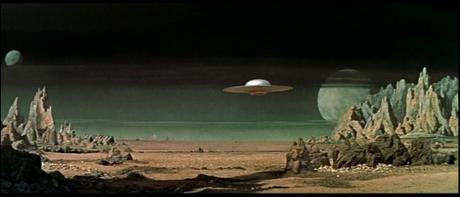 United Planets Space Cruise C-57D, approaching the Forbidden Planet
United Planets Space Cruise C-57D, approaching the Forbidden PlanetThe familiar and faintly comforting sound of Leo the Lion — MGM’s symbol of quality and excellence in motion picture arts and science — opens what was to have been a formula-B programmer. Instead, the Hollywood studio that gave larger than life presence to such icons as Greta Garbo, Clark Gable, Joan Crawford, Gene Kelly, Judy Garland, Katharine Hepburn, Spencer Tracy, and dozens more had wisely invested its money (and know-how) in an out-of-this-world science-fiction epic.
The forerunner of 2001: A Space Odyssey, Star Wars, Star Trek, Alien, Close Encounters of the Third Kind, Terminator, and other big-screen spectaculars, 1956’s Forbidden Planet (the original title was Fatal Planet) emerged head-and-shoulders above the usual bug-eyed monster movie of the fifties. Though not the first of its type to be released — 20th-Century Fox’s The Day the Earth Stood Still, RKO’s The Thing (from Another World), and Universal’s This Island Earth preceded it by several years — Forbidden Planet was certainly the most prestigious in terms of budget, size, sets and production values. It was Metro-Goldwyn-Mayer’s premier excursion into the realm of outer space.
Based on characters found in Shakespeare’s The Tempest, the story was conceived by Irving Block and Allen Adler. Novelist and scriptwriter Cyril Hume shaped the effort into a satisfying screenplay, combining elements of classical mythology, Freudian pop psychology, and author Isaac Asimov’s three laws of robotics (from his collection of I, Robot stories, first published in December 1950) in order to relate an interplanetary tale of man’s hubris in the face of forces beyond his control.
Forbidden Planet formed its core narrative around Professor Edward Morbius (Walter Pidgeon), a brainy philologist who has been “stranded” on the planet Altair-IV for the better part of two decades. Left to his own devices (and with the aid of a so-called “Big Machine” left there by its former inhabitants), Morbius has learned to harness the planet’s elemental force so as to set up a private domain for himself and his comely daughter Altaira (Anne Francis), or Alta for short.
When an investigating United Planets Space Cruiser, headed by the straight-laced Commander John J. Adams (Leslie Nielsen), invades his pet paradise and attempts to take him back to Earth against his not inconsiderable will, Morbius unleashes this planetary force in true mad scientist-gone-amok fashion.
Followers of the genre have marveled at the film’s depiction of the Krell, an advanced alien civilization that, technologically as well as intellectually, was a million years ahead of humankind. Morally and ethically, however, they were as burdened by secreted bouts of lust, power and revenge as man himself had been. Despite never being seen, viewers came away from the picture knowing as much if not more about the wonders of this incredible race of beings as they did the all-too-fallible humans.
Roar of Approval

Starting things off with the lion’s roar — a harbinger of the bellowing Id monster that will take center stage as the story progresses and unfolds— is a masterstroke of foreshadowing and anticipatory plot devices. Movie critics and industry insiders have long pointed up the similarity between these two creatures. When the film is glimpsed in one uninterrupted sitting, Leo and his Id counterpart provide a neat “bookend effect” to the inevitability of events as they begin to take shape.
The creepy “electronic tonalities” by Louis and Bebe Barron, standing in for what would have been a full-blown orchestral score, distinguish this feature from earlier low-budget entries. It may even have been the first documented instance of cinematic “white noise.” Nevertheless, the use of the exotic-sounding theremin in the soundtracks to Spellbound, The Lost Weekend, the aforementioned The Thing, and Abbott and Costello Meet Frankenstein no doubt cleared the path for studio head Dore Schary to green-light the Barron’s avant-garde sound project for admission into Forbidden Planet’s world.
Les Tremayne, a mainstay of many a sci-fi outing from the genre’s peak period, provides the introductory voice-over lauding the discovery of hyper-drive and light speed technology, which led to the inevitable “conquest and colonization of deep space.” This line of thought, of man extending his reach outside his current capacity and into the farthest regions of the universe, would be incorporated into visionary producer Gene Roddenberry’s idea for the TV series Star Trek and its crew of intrepid explorers.
Speaking of which, the C-57D space cruiser’s all-male crew — “eighteen competitively selected, super-perfect physical specimens with an average age of 24.6 years” — has been locked up in hyperspace for 378 days, not exactly the kind of circumstance that would be conducive to the presence of a long-legged blonde gamine, but there you have it.
Just as the cruiser enters Altair-IV’s oxygen-rich atmosphere, science officer Chief Quinn (Richard Anderson) receives a radar transmission from the cryptic Professor Morbius. As the only surviving member of the Bellerophon expedition of 20 years prior, Morbius talks in evasive circles around the insistent Commander Adams. Indignant at first with the officer’s stated purpose, Morbius grudgingly agrees to provide landing coordinates for the craft. At the same time, he washes his hands of all culpability for what might befall its crew, a vague allusion to something far more sinister.
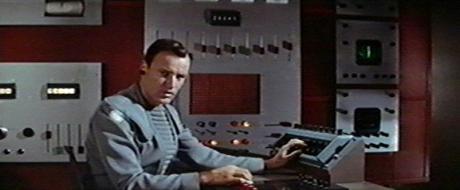
We discussed at the outset the so-called mythological aspects of the plot, which start to make steady inroads at the mention of the name Bellerophon, the ship that brought Dr. Morbius, his future wife, and the other members of his party to Altair-IV in the first place.
In Greek mythology, Bellerophon was a mortal who had once been favored by the gods. He slew the dreaded Chimaera and even tamed the fabled winged horse Pegasus. But pride and arrogance took over his persona, so much so that he attempted to gain immortality by riding Pegasus straight up to Mount Olympus, the playground of the gods. Zeus, the head god, sent a gadfly to sting the steed, causing Bellerophon (à la Icarus) to fall ingloriously back down to Earth. He spent the rest of his days as a wandering cripple in the manner of King Lear.
With this back-story in mind, the cruiser lands on a barren wasteland; its surface bereft of “cities, ports, roads, bridges, dams” — in short, any recognizable structure indicative of a thriving society. No sooner does the crew disembark when it is confronted with the sight of a distant vehicle hurtling at supersonic speed. The driver of the vehicle is none other than Robby the Robot, a paradigm of man’s impulse to manage his surroundings by creating an artificial being — a mechanical Guy (or Gal) Friday, if you will — with extraordinary intelligence and superhuman strength, as well as highly refined social skills.
Robby’s soothing voice (belonging to actor Marvin Miller) and cultivated air of sophistication give Commander Adams the impression that all will be well. Agreeing to be escorted to the doctor’s residence, Adams boards the vehicle, taking with him Lt. Jerry Farman (Jack Kelly) and Lt. “Doc” Ostrow (Warren Stevens). As the men approach the abode, they are coldly greeted by Morbius, who stands in shadows inside the doorway — an elusive, solitary figure determined to plow on with his research despite the intruders. His intention is to show how safe and secure he’s been without the aid of outside interference.
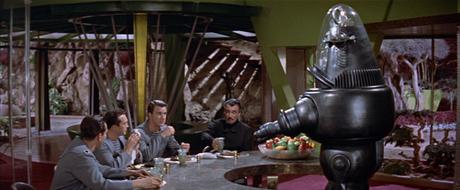
After lunch, Morbius decides to demonstrate a bit of the Robot’s abilities, including his “absolute selfless obedience” to orders — except, of course, when they clash with Robby’s built-in safety mechanism whereby he is forbidden to harm a human being.
When pressed for details as to the whereabouts of his shipmates, Morbius explains their absence: one by one, they succumbed to an interplanetary force, “some devilish thing that never once showed itself.” He and his wife, the late Julia Marsin, remained immune to its influence. The others, however, were torn limb from limb and the Bellerophon vaporized upon takeoff.
Despite Morbius’ earnest yet awkward attempts at reassurance, the men remain jumpy and ill at ease, particularly when he activates the steel shudders that loudly surround his home.
The Pause that Refreshes
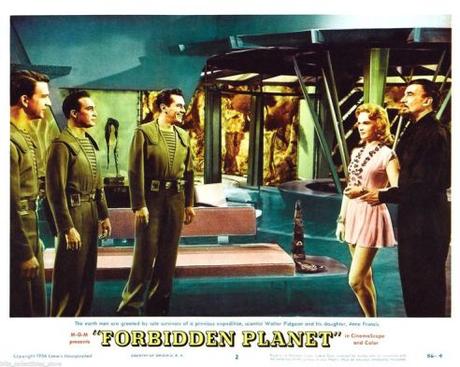
It’s at this point in his remembrances of bygone times that a graceful gazelle named Alta appears. Standing motionless in the entranceway, she calls to her father in a seductive tone. Immediately, Alta commands the undivided attention of the three visitors, one of whom (Lt. Farman) stumbles over himself in offering her some refreshment. Even though story-wise we are three centuries into the future, the men’s actions around this vision of loveliness — especially that of Lt. Farman — is typical of 1950s male behavior. One should mention his over-eagerness to be of assistance.
Since this is Alta’s first (ahem) experience with others of her race, Farman’s conduct goes completely over her head, which both amuses and perturbs her parent. Morbius admits to Adams and Ostrow the need to take his daughter back to Earth for her “natural development.” Ostrow agrees: “I should say fairly soon too.” The philologist’s patriarchal realm, a virtual Mount Olympus in miniature, has been encroached upon by these three “very fine exceptions” of Homo sapiens, only one of who will get to first base with his virginal child.
Stepping away from the others, Farman tries to get a leg up on his commanding officer by convincing Alta that Adams is a notorious space wolf “known throughout seven planetary systems.” Shaking his head and wagging his finger at her, Farman warns that, “Any girl or woman who lets him get her alone, anywhere,” is asking for trouble. Alta is intrigued, but concurs with his findings by catching the fire in Adams’ eyes. No such fire in Farman’s eyes, of that she is sure. Farman takes offense at this slight and insists he’s not entirely harmless.
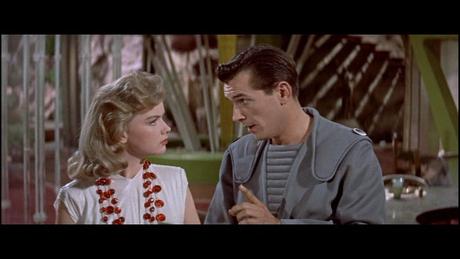
At that moment, Quinn checks in to view the surroundings. A wolf whistle escapes from his lips as he spots Alta’s mini-skirted form. “Knock that off,” orders Commander Adams. It’s apparent to dad (and to us) that Alta is as enchanted by these “unbelievable” specimens as they are with her. She falls especially hard for Adams, the de facto leader of the group. When the officers take their leave, Alta gives the commander a long, hard look.
Until now, the conversation has been informal and routine, albeit tense — that is, if one takes into account the commander’s quite natural suspicions about the fate of the Bellerophon’s crew. The few references to the lady of the household come from Ostrow, who inquires as to whether she’s at home today. Morbius offers a rather dry response: his wife died six months after the others, only of natural causes. Ostrow then remarks that he thought Robby evinced some “very charming feminine touches,” hence our Guy/Gal Friday designation and sci-fi’s first ever asexual/bisexual artificial being.
The introduction of Alta into this all-male equation, a transitory disruption to the status quo, changes the balance of power from Morbius to his daughter. The discussion promptly shifts from domesticity as a topic — already touched upon in Ostrow’s observation about the Robot, and in Morbius’ demonstration of the handy “dispose-all” unit (“A housewife’s dream,” in Ostrow’s words) — to playfulness and innuendo, taken one step further by Farman’s libidinous interjections.
Through visual and verbal cues, i.e., sideways glances, whispered asides, and furtive gestures, the atmosphere becomes charged with sexual tension; the temperature in the room has been elevated, too, by several notches. The sense we have of the situation is that a conflict will arise by Alta’s attendance — a conflict that will bring about a cataclysmic cost to all concerned.
Love Ain’t Such a Splendored Thing
If possession is 9/10ths of the law, as they say, then Adams may be out of luck. For, in the ensuing scene where Alta visits the cruiser’s landing site and casually wanders off with Farman behind some jagged rocks, the commander can’t take his eyes off her. He is barely able to carry on with his duties as skipper, much less pay attention to Quinn and the others.
In the meantime, the Cook (Earl Holliman) provides some comic relief with his mechanical straight man, Robby. He has the Robot sample his last bottle of bourbon, a potable token of an “advanced” culture wallowing in the most basic of human weaknesses. Robby promises to run off 60 gallons of the “stuff,” thus contributing to Cookie’s habit of imbibing while off-duty.
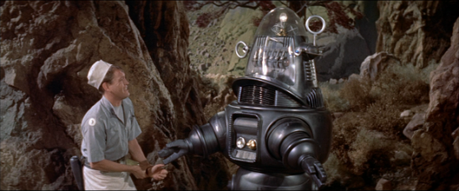
This sequence highlights one of the many nods to a once-acceptable social practice of the 1950s, that is, of getting smashed at all costs. Later, when Cookie is reported as having been “falling down drunk” on the hooch that Robby provided him, his excuse is that he and the Robot were together the whole time the ship was being attacked, a tidy alibi.
Returning to our couple, we find Farman locked in an embrace, trying to instruct Alta in the healthy art of kissing and hugging. “All the really high civilizations go in for it,” he insists. Just the thing to stimulate the system, and earn the envy of his commanding officer! After several attempts at getting a rise out of the girl, a frustrated Farman (I would add, a sexually frustrated Farman) turns to her and asks if she’s giving him the “treatment” — in other words, “don’t brush me off, kid.”
In Farman’s company, she’s as cold as a mackerel. That’s about to change when Commander Adams re-enters the picture and decides to pull rank on his subordinate. A flustered Lt. Farman is dismissed, leaving the commander to sharply scold the oblivious Altaira for allowing a “space wolf like Farman” (branding the lieutenant with the same pejorative label Farman had earlier used on him) to take undue advantage of the situation, especially when she’s so scantily clad. “For Pete’s sake, go home and put on something … anything.”
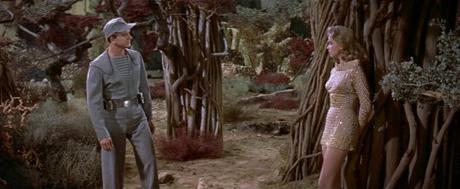
Poor innocent Alta has a great deal of difficulty comprehending the cause of the commander’s anger. Her wits and childlike naiveté, which served her well in the preceding episode and in the comfort of her father’s living room — surrounded, as she was, by her “friends” (two white-tail deer and a full-grown Bengal tiger!) — have abandoned her under this new set of circumstances. To add to her turmoil, she has no idea what to make of Adams’ reaction, or how to deal with the newly-discovered emotions brewing inside her.
Equally disconcerted as well, Adams sends her off in even harsher language than he used on Farman. “Get out of here before I have you run out of the area under guard,” he barks, “and then I’ll put more guards on the guards!”
Back at the house, Alta repeats the commander’s rude comments to her father, who listens calmly to her outburst. He hears about how much she dislikes him, the look he gave her, and how he raised his voice at her. “What about?” Morbius inquires. She hasn’t a clue. “I was only trying to be nice about kissing the lieutenant,” she explains. Morbius raises an eyebrow. “How did the commander react to that?” Why, he was furious, is her reply. She never wants to see him again, ever! (Famous last words, or there would be no rest of the picture.)
The best she could do now, Morbius counsels her, is to go to bed. Claiming he has some unfinished business in his study, he kisses his daughter on the brow and departs.
Alta then beams for Robby the Robot, who, as we probably know, is busy preparing those 60 gallons of booze for the soon-to-be-besotted Cook. When he finally does appear, Alta demands that he make a new dress for her, one with nothing showing. No long legs, no curvy waist, no perfect ankles, nothing but a nice, boring gown. “Radiation-proof?” Robby quizzes her. “No, just eye-proof will do.” Oh, and while you’re at it, spiff it up with some diamonds and emeralds. Gotcha!
Brimming with joy and excitement, Alta hugs the Robot as if he were TV’s Hazel, the maid with all the answers. She saunters off to bed, with nary a care in the world as to whether she’ll have a good night’s rest or not.
A Few Words to the Wise
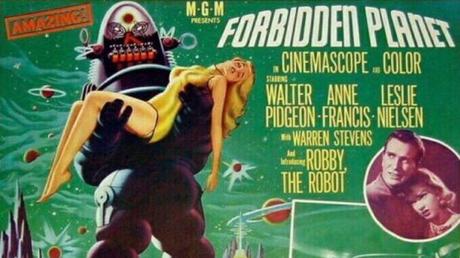
When I was an adolescent, those silly smooching episodes would annoy me to no end. Like most kids my age and younger, I wanted the actors to get on with the show; to move past these nonsensical time-wasters and get to the good parts, i.e., the business with the mysterious Krell and, of course, the nighttime “visitation” of the Id monster.
Today, I am fortunate to have acquired a healthy dollop of patience where its concerns my movie viewing. In doing independent research for this film I learned that during the time of Forbidden Planet’s release and, afterward, when it was reissued to second-run cinemas, the “kissing scenes” were snipped for the kiddy matinees and, as luck would have it, for local television viewing where my family and I first caught it.
Had I known it at the time, I would surely have realized that these and all the early scenes, which take up the first third or so of the picture’s running time, provide the missing keys to understanding the story’s plot and theme: that of man’s inability to tame his bestial nature — his baser instincts of hate, lust, bias, greed, carnal desire, want, need, and survival at any cost; eventually, to rise above the specie’s’ intrinsically destructive nature, that of “the beast, the mindless primitive,” and one day ascend to the heights the Krell had risen, only to fall back down again (like Bellerophon) as all mortals are wont to do.
In Altair IV’s paradisiacal Garden of Eden, Commander Adams could be considered the “first man,” i.e., his namesake Adam. Young Alta, an offshoot of Altaira (the name itself derived from the planet on which she was born), could be the “first woman,” but one who has attained the “highest position” in the evolutionary cycle (ergo the name “Alta,” meaning the “highest”).
On the opposite scale, Professor Morbius, the loving father and authority figure, is a deeply flawed individual. At this stage in the story, he seems a benign character — intelligent, yes; by all means, brilliant; but secretive and enigmatic, purposely withholding of vital information that, during the course of the picture, will be divulged to his visitors only at crucial intervals.
Later in the movie, Morbius states his personal credo “that man is unfit to receive such knowledge, such almost limitless power.” His scholarly opposite, “Doc” Ostrow, counters his argument with one of his own: “Whereas Morbius, with his artificially expanded intellect, is now ideally suited to administer this power for the whole human race.”
That remains to be seen …
(End of Part One)
Copyright © 2016 by Josmar F. Lopes

